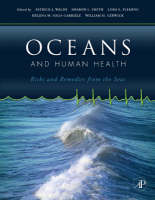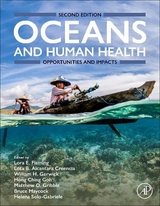
Oceans and Human Health
Academic Press Inc (Verlag)
978-0-12-372584-4 (ISBN)
- Titel erscheint in neuer Auflage
- Artikel merken
Oceans and Human Health highlights an unprecedented collaboration of environmental scientists, ecologists and physicians working together on this important new discipline, to the benefit of human health and ocean environmental integrity alike. Oceanography, toxicology, natural products chemistry, environmental microbiology, comparative animal physiology, epidemiology and public health are all long established areas of research in their own right and all contribute data and expertise to an integrated understanding of the ways in which ocean biology and chemistry affect human health for better or worse. This book introduces this topic to researchers and advanced students interested in this emerging field, enabling them to see how their research fits into the broader interactions between the aquatic environment and human health.
Lora E. Fleming is a physician and epidemiologist with expertise in the environment and human health; she is based at the European Centre for Environment and Human Health [www.ecehh.org] (University of Exeter Medical School). She is involved in research, training and policy activities in the new transdisciplinary area of Oceans and Human Health. She participated as a Co Editor in the first edition of Oceans and Human Health: Risks and Remedies from the Seas (2008), in Seas, Society and Wellbeing (2011), and in the European Marine Board Oceans and Human Health White Paper (2014). She co-Directed the NSF NIEHS Oceans and Human Health Center at the University of Miami; and she received the Oceans and Human Awards from the Edouard Delcroix Foundation (2014) and the IOC Bruun Award (2015). Prof Fleming led the H2020 funded Projects: BlueHealth (https://bluehealth2020.eu) to explore the connections between blue environments and human health; and Seas, Oceans and Public Health in Europe (SOPHIE) (https://sophie2020.eu) to create a strategic research agenda for Ocean and Human Health in Europe and beyond; and participated in the UKRI GCRF Blue Communities Project (https://www.ecehh.org/research/blue-communities/). Professor Fleming is currently collaborating to establish Healthcare Ocean (https://www.nhsocean.org), and is involved in issues around international Blue Justice and other aspects of international oceans and human health. Helena Solo-Gabriele is an environmental engineer whose research focuses on studies that relate the environment to human health; her primary faculty appointment at the University of Miami (Coral Gables, FL USA) is in the Department of Chemical, Environmental and Materials Engineering. At the University, she teaches courses in environmental measurements, water quality, water and wastewater treatment, and in environmental engineering microbiology. Much of her research focuses on understanding the fate and transport of microbes in the coastal zone where she has teamed up with epidemiologists to evaluate human health impacts from bathing and beach sand contact. She participated as a Co-Editor in the first edition of Oceans and Human Health: Risks and Remedies from the Seas (2008). She was a co-Principal Investigator of the NSF NIEHS Oceans and Human Health Center directed by Professors Fleming and Smith at the University of Miami and Principal Investigator of the Beach Exposure and Child Health Study which aimed to evaluate children’s exposure to chemical and microbial contaminants during beach play activities. Professor Solo-Gabriele continues to conduct research studies evaluating relationships between microbes in the environment and human health. Most recently her attention has turned to focusing on using wastewater to assess illness rates in communities, in response to the recent COVID-19 pandemic. She hopes to use knowledge gained through this unprecedented pandemic to better understand pathogens in the nearshore environment.
Globalization and global ocean change: an overview of influences on human health; Background oceanography; Managing public health risks: role of integrated ocean observing systems (IOOS); Climate and human health: physics, policy and possibilities; Hurricanes; Tsunamis; Oceans and human health: human dimensions; Background toxicology; Organic pollutants: presence and effects in humans and marine animals; Metals: ocean ecosystems and human health; The fate of pharmaceuticals and personal care products in the environment; Exposure and effects of seafood-borne contaminants in maritime populations; Epidemiologic tools for investigating the effects of oceans on public health; Toxic diatoms; Toxic dinoflagellates; Ciguatera fish poisoning: a synopsis from ecology to toxicity; Cyanobacteria; Pfiesteria; Media coverage of environmental health issues: where morality, science, and the news reflect and depend on fundamental philosophical perspectives; Waterborne diseases and microbial quality monitoring for recreational water bodies using regulatory methods; Food-borne infectious diseases and monitoring of marine food resources; Emerging technologies for monitoring recreational waters for bacteria and viruses; Future of microbial ocean water quality monitoring; Anticancer drugs of marine origin; Discovering anti-infectives from the sea; Marine proteins; Novel pain therapies from marine toxins; Emerging marine biotechnologies – cloning of marine biosynthetic gene clusters; Aquatic animal models of human health; Aquatic animal neurophysiological models; Toadfish as biomedical models; Lower deuterostomes as models of the developmental process; The zebrafish, DANIO RERIO, as a model organism for biomedical research; Carcinogenesis models: focus on xiphophorus and rainbow trout; New approaches for cell and animal preservation: Lessons from aquatic organisms
| Erscheint lt. Verlag | 21.4.2008 |
|---|---|
| Verlagsort | San Diego |
| Sprache | englisch |
| Maße | 216 x 276 mm |
| Gewicht | 1940 g |
| Themenwelt | Sachbuch/Ratgeber ► Natur / Technik ► Natur / Ökologie |
| Naturwissenschaften ► Biologie ► Ökologie / Naturschutz | |
| ISBN-10 | 0-12-372584-4 / 0123725844 |
| ISBN-13 | 978-0-12-372584-4 / 9780123725844 |
| Zustand | Neuware |
| Informationen gemäß Produktsicherheitsverordnung (GPSR) | |
| Haben Sie eine Frage zum Produkt? |
aus dem Bereich



